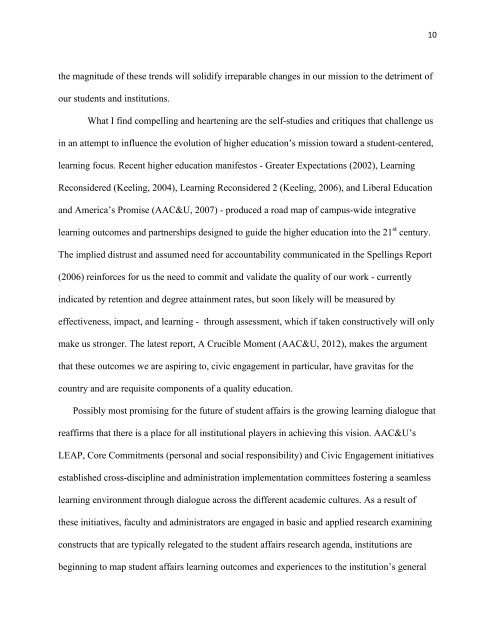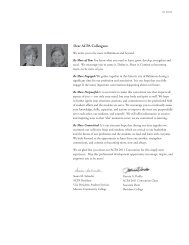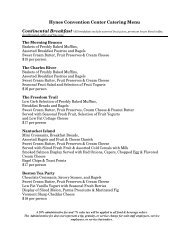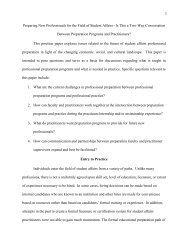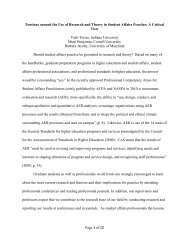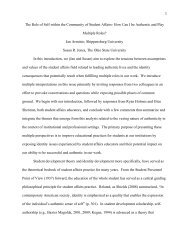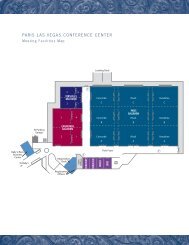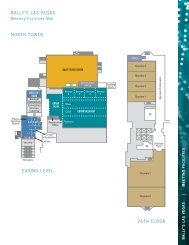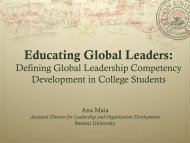Is Student Affairs Relevant for the 21st Century? Tony W. Cawthon ...
Is Student Affairs Relevant for the 21st Century? Tony W. Cawthon ...
Is Student Affairs Relevant for the 21st Century? Tony W. Cawthon ...
You also want an ePaper? Increase the reach of your titles
YUMPU automatically turns print PDFs into web optimized ePapers that Google loves.
<strong>the</strong> magnitude of <strong>the</strong>se trends will solidify irreparable changes in our mission to <strong>the</strong> detriment of<br />
our students and institutions.<br />
What I find compelling and heartening are <strong>the</strong> self-studies and critiques that challenge us<br />
in an attempt to influence <strong>the</strong> evolution of higher education’s mission toward a student-centered,<br />
learning focus. Recent higher education manifestos - Greater Expectations (2002), Learning<br />
Reconsidered (Keeling, 2004), Learning Reconsidered 2 (Keeling, 2006), and Liberal Education<br />
and America’s Promise (AAC&U, 2007) - produced a road map of campus-wide integrative<br />
learning outcomes and partnerships designed to guide <strong>the</strong> higher education into <strong>the</strong> 21 st century.<br />
The implied distrust and assumed need <strong>for</strong> accountability communicated in <strong>the</strong> Spellings Report<br />
(2006) rein<strong>for</strong>ces <strong>for</strong> us <strong>the</strong> need to commit and validate <strong>the</strong> quality of our work - currently<br />
indicated by retention and degree attainment rates, but soon likely will be measured by<br />
effectiveness, impact, and learning - through assessment, which if taken constructively will only<br />
make us stronger. The latest report, A Crucible Moment (AAC&U, 2012), makes <strong>the</strong> argument<br />
that <strong>the</strong>se outcomes we are aspiring to, civic engagement in particular, have gravitas <strong>for</strong> <strong>the</strong><br />
country and are requisite components of a quality education.<br />
Possibly most promising <strong>for</strong> <strong>the</strong> future of student affairs is <strong>the</strong> growing learning dialogue that<br />
reaffirms that <strong>the</strong>re is a place <strong>for</strong> all institutional players in achieving this vision. AAC&U’s<br />
LEAP, Core Commitments (personal and social responsibility) and Civic Engagement initiatives<br />
established cross-discipline and administration implementation committees fostering a seamless<br />
learning environment through dialogue across <strong>the</strong> different academic cultures. As a result of<br />
<strong>the</strong>se initiatives, faculty and administrators are engaged in basic and applied research examining<br />
constructs that are typically relegated to <strong>the</strong> student affairs research agenda, institutions are<br />
beginning to map student affairs learning outcomes and experiences to <strong>the</strong> institution’s general<br />
10


